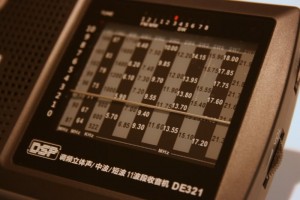 I’m not surprised to find that North Korean families hide shortwave radios. After all, if it’s well hidden, and listened to privately, there is no way the government can monitor what is heard on shortwave, nor trace it back to the family listening. This is what separates radio from the Internet and mobile devices:
I’m not surprised to find that North Korean families hide shortwave radios. After all, if it’s well hidden, and listened to privately, there is no way the government can monitor what is heard on shortwave, nor trace it back to the family listening. This is what separates radio from the Internet and mobile devices:
(Source: New Focus International)
Many North Korean families keep a secret item at home, whose discovery may lead to harsh punishment. Away from prying eyes and in the privacy of their homes, North Koreans enjoy using items forbidden by the state, according to North Koreans who have recently escaped from the country.
“In every North Korean home, there is at least one secret item” says Jung Young-chul* (age 34), who left Korea in 2012. He had a short-wave radio in the house and the family would secretly listen to South Korean broadcasts. To avoid being caught, they kept the radio hidden under a container for keeping rice.
They were not the only ones with a hidden radio. Jung explains, “Once, a friend described a story that I had heard the night before while listening to a South Korean broadcast. I brought it up with him one night in drink, and he confided that his family too had a radio. We laughed about it together.”
If you want to hear North Korean propaganda on shortwave radio (via the Voice of Korea), check here for the latest schedule or even listen to this recent recording.
This post tagged in the category: Why shortwave radio?

Thanks for another interesting article on why shortwave still matters… and another reason to keep contributing to Ears to Our World http://etow.org/
-Mike
Thanks so much, Mike!
The World Radio Network has several daily North Korea English transmissions available for on-demand listening at the WRN website. These are captured over the air. See WRN.org .
Thanks, Rich,
I had forgotten about this. I find it so interesting that WRN is playing on air recordings of the Voice of Korea. I believe Mark Fahey mentioned this as well.
-Thomas
Using a superheterodyne shortwave radio in DPRK could be fatal. The local oscillator/s could be detected by the authorities. A crystal radio would be far safer, given there is no LO.
In WWI (& II), allied soldiers made foxhole crystal radios using a slightly oxidised razor blade & a safety pin as the detector diode to avoid being targeted by German artillery, which was aimed by detecting superhet rcvr LOs via radio direction finding.
No. Soldiers built “foxhole radios” because they likely had no space for a full size radio, and likely weren’t allowed to carry that sort of personal items. They could make the foxhole radio from available parts, find some wire, steal a headphone from something, and of course the razor blades at the time could be used as detectors. This wsa for the sake of entertainment, there isn’t much to do in a foxhole when there’s no fighting.
There really wasn’t broadcasting in WWI (it came later, and in WWI most non-military transmitting had to shut down for the duration, and it would have been spark gaps, certainly not useful for sending voice.
On the other hand, it’s true, a superhet (or regen or superregen) receiver will radiate, and it is possible to track someone that way, though of course the radiated signal is quite low power. I’m not sure if that’s how the UK regulatory body found people with unlicensed radios, but there were instances of ships at sea being found by submarines by picking up the radiated signal from some consumer receiver. I remember one surplus military receiver that had a stage at the front end that didn’t really amplify, it was there so the local oscillator had a harder time getting to the antenna.
An interesting sidenote. I once read a book about prisoners of war in WWII, and apparently officers were given training in evasion and escape as part of their officer training. They realized from WWI that escapees did use up resources of the enemy, so it was seen as strategy in WWII. And the Red Cross boxes sent to the POWs were actually part of it. Yes, the prisoners liked to get chocolate, but it was included in part to bribe guards. And things to build crystal radios (or razor blade radios) were hidden in the box itself, or otherwise disguised. So while I always thought what happened in “The Great Escape” was initiative by the prisoners, it turns out to be more organized than that.
And oddly enough, there are instances of POWs scrounging and making the right parts to build receivers that were better than crystal radios. At one camp, they kept a radio in a can of oil, and had to dry it out before using it. One camp even had a transmitter, which they never used. But they had it because they figured that as the war ended, they might have a need to call for help, in case the Germans decided to liquidate the camps.
Michael
Do you happen to remember the name of the book?